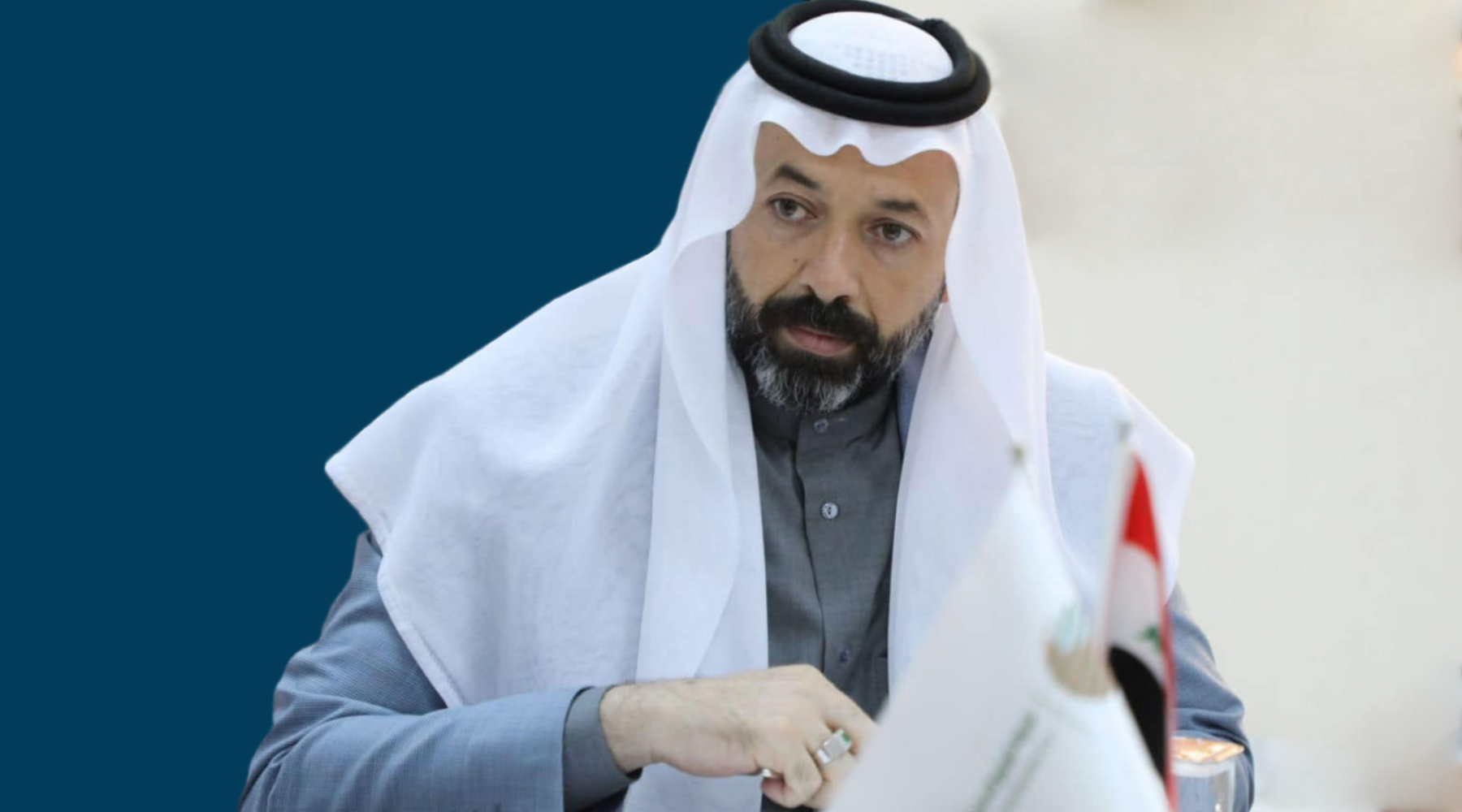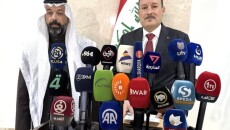A member of the Kirkuk Provincial Council representing the Arab component revealed that, under the political agreement to form the local government, the position of Kirkuk Governor will be rotated starting January 1, 2026, to Turkmen, followed by Arabs.
He noted that this rotation was agreed upon by a number of politicians, including the Secretary-General of the Asa'ib Ahl al-Haq AAH movement, Qais al-Khazali.
In this interview with KirkukNow, Al-Assi discusses the reasons for his withdrawal from the coalition that formed Kirkuk local government and his subsequent return to provincial council meetings, along with details related to several issues, including appointments and violations.
Omar al-Hilali: The first question is not journalistic, but rather based on the statements of some citizens who say that Sheikh Dhahir and Ra'ad al-Saleh's participation in forming the Kirkuk administration was in exchange for money, and that their subsequent withdrawal and return were for funds and gains?
Dhahir Al-Assi: I applaud your bold and frank question. First, we were accused of taking money in exchange for forming the administration, which took place at the Rashid Hotel (Baghdad). However, we proved that we did not take money by withdrawing in protest against the non-implementation of the agreement's terms. As members of the provincial council, we remain adamant about these demands, which are included in the terms of the political agreement. If we had taken money in exchange for our participation in forming the government, we would have hesitated to withdraw, or when we withdrew, they would have proven that we had received money in exchange for our participation.
Later, we were accused of withdrawing from the formation of the administration as an obstruction of the political agreement in exchange for money. The main reason for our withdrawal was to protest the Patriotic Union of Kurdistan's failure to abide by the terms of the agreement, particularly regarding the issue of the missing. The second reason was the Arab parties' monopoly over determining Arab representation, as if council members had no role. Today, we are a bloc and operate on this basis. Therefore, the Arab component's entitlement must be distributed based on the number of Arab members on the provincial council.
Omar Al-Hilali: Who do you mean by "we," the council members or the Arabs? How many other council members held the same position?
Dhahir Al-Assi: I mean the two members, Raad Al-Saleh and me. When we were accused of violating the political agreement, we reiterated our commitment to all the terms of the political agreement and did not renege on them, in order to ensure its implementation. This agreement includes national and local figures who have influence over its implementation. Our commitment to them was through protest and withdrawal from the administration formation coalition, not boycott or withdrawal from the council.
Omar Al-Hilali: So you can call yourselves the opposition?
Dhahir Al-Assi: Yes, we oppose the governorate's administration policy. However, to be more precise, our withdrawal from the coalition forming the administration meant our independence in decision-making and our lack of commitment to the political agreement. This means that we are not affiliated with any party or organization that would force us to attend any governorate council session if it doesn't produce results. And that's what we did. We were invited to four or five sessions, but we didn't attend because they weren't effective. However, our opposition in this manner and our failure to attend led to the disruption of the sessions and the council's oversight role. It actually had a negative impact on the delivery of services to citizens. Those forming the governorate administration treated us as boycotters, which almost negatively impacted our supporters.
Omar Al-Hilali: Was that the reason for your return?
Dhahir Al-Assi: We were forced to return to ensure the integrity of the political agreement and to avoid being accused of reneging on it.
Omar Al-Hilali: If you withdraw from the political agreement now, will the balance be disrupted? For example, will the governor remain in his position?
Dhahir Al-Assi: We are approaching this issue logically and objectively, just as we have expressed our protest over the non-implementation of the agreement's provisions. On the other hand, the other bloc will protest and refuse to abide by the agreement. They will claim that the Arab side influenced the political agreement's progress. At that point, we will be in a weak position, and our supporters will accuse us of being the reason for the agreement's failure or of taking money.
Omar Al-Hilali: Returning to the agreement to form the administration, let's assume we reach the end of this year. What will happen? Will the positions remain as they are now or will they change? What are the procedures for rotating positions? Will the governor submit his resignation? Who will the position go to? An Arab or a Turkmen?
Dhahir Al-Assi: There is a documented political agreement. The political agreement stipulates that the position of Kirkuk Governor will be rotated on January 1, 2026. Whether the position will go to an Arab or a Turkmen will be determined by agreement. However, the political agreement states that the position will be rotated to a Turkmen and then to an Arab. The governor will not submit his resignation, but will join the council. In a quorum session, he will be summoned for questioning. After that, there will be a legal procedure, the details of which I do not want to go into now, but the dates are set, and there is a legal and consensual procedure.
There are also national guarantors in Baghdad for this political agreement, and they have emphasized the implementation of the provisions of the political agreement at all stages of our work.
Omar Al-Hilali: Who are these parties? For example, the Secretary-General of the Asa'ib Ahl al-Haq Movement, Sheikh Qais Khazali; the President of the Patriotic Union of Kurdistan, Pavel Talabani; or the President of the Babylonian Movement, Rayan al-Kildani? But there was also talk that you met with Qais Khazali after the withdrawal decision. Did you reach a conviction that there is a guarantee for the implementation of the agreement?
Dhahir al-Assi: So far, the true national guarantor is Sheikh Qais Khazali, as he has expressed his willingness to commit to and implement the political agreement. (The head of the Progress Party, Mohammed al-Halbousi) is part of the political agreement, but one of the guarantors is Sheikh Qais Khazali.
Omar al-Hilali: How will the position of Kirkuk Governor be rotated if the Turkmen Front does not nominate a candidate?
Dhahir al-Assi: The Turkmen have not yet announced their non-participation or their non-nomination of a Turkmen candidate. These are merely possibilities. If they do not nominate a candidate, the platform will go to the Arabs. We have an understanding.
We're good with the Turkmen on this issue. Perhaps we'll reach an agreement that the position will go to Arabs first, then to Turkmen. However, in terms of commitment, we are committed to the agreement to form the local government.
Omar al-Hilali: In the last provincial council session held after your return, what did you discuss, and what did you achieve for the people of Kirkuk?
Dhahir Al-Assi: The most important issue for us is the issue of services, which we were responsible for delaying, especially the issue of launching the electronic link for the 7,000 job positions, for which council members, both boycotting and participating, are being blamed. Therefore, this issue was the most important item in the session, based on my request and the request of Raad al-Saleh. Today, through you, I give good news to all the people of Kirkuk that the link to apply for appointments will be launched very soon, as part of a transparent and secure process.
Omar al-Hilali: How will the 7,000 job positions be distributed among the city center, districts, and sub-districts?
Dhahir Al-Assi: The 7,300 job positions are accompanied by a mechanism and application process determined by the Ministry of Finance and the General Secretariat of the Council of Ministers. To ensure everyone receives their rights, they were distributed to administrative units according to population ratios, based on statistics from the Ministry of Planning, not the latest population census. These appointments are for 2023, i.e., before the census.
Omar Al-Hilali: When you left the council, you have shown yourself as a victor by announcing the appointments link, while the council president had stated a week earlier that the link would be launched soon.
Dhahir Al-Assi: But even six months ago, and even a year ago, everyone was talking about the imminent release of job positions, but to no avail.
Omar Al-Hilali: You mentioned the service aspect. What other service aspects did you discuss in that session?
Dhahir Al-Assi: The Encroachment Removal Committee was hosted, and it is monitored by all the people of Kirkuk, especially the Arab community. They are monitoring the process of removing encroachments (illegally-built houses), especially in our Arab neighborhoods, given that encroachments are more prevalent in these areas. When the council sessions faltered, we were accused of being absent from the sessions, which led to the concentration of encroachment removal operations in Arab areas. Therefore, we decided to discuss the details of the Encroachment Removal Committee's procedures and determine how to mitigate the phenomenon of encroachment. From now on, the Encroachment Removal Committee will be accompanied by a technical and legal representative from the provincial council.
I have not yet declared my victory, and we have not been victorious. However, we are faced with a reality: we are a fundamental pillar in the formation of the provincial council and the current administration. Therefore, our absence and distancing from the council will have more negative repercussions than if we were present. I will not say I am victorious, and I have not said so. However, it is our duty to adhere to the political agreement, and I believe that the primary gain is the implementation of the terms of the political agreement, especially after the political parties and the guarantor party confirmed that our return will lead to the agreement's implementation within a short period.






